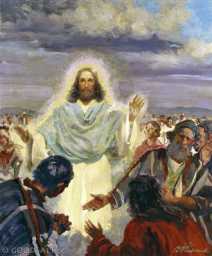Christ Appearing to His Own

The opening verses of the Life of Christ are in the nature of a prologue, so the closing verses are more or less an epilogue. In the former, the Ruach Ha’Kodesh has revealed Messiah before He came from the Father; in the latter the Holy Sprit has shown how Christ now rules the universe after His return to the Father. Everything here has a profound significance. We see Yeshua Messiah appearing at the Sea of Tiberius and reinstating Peter (John 21:1-25). We learn about Christ giving the great commission on a Galilean mountainside (Matthew 28:16-20). And we read about the risen Lord teaching so His disciples could understand the Scriptures and being taken up to heaven from the vicinity of Bethany, which is on the eastern slope of the Mount of Olives (Luke 24:44-53).
Note that after rising from the dead, Meshiach appeared only to believers . . . His own. If His followers doubted His resurrection, it was not because they doubted the truthfulness of His claims; they merely thought the resurrection was too good to be true. So Jesus welcomed their belief, while tenderly offering evidence to build their confidence in the truth of His resurrection. Even so, He praised those who believed in His resurrection without much need for proof. Because you have seen Me, you have believed; blessed are those who have not seen and yet have believed (to see link click Mk – Jesus Appears to Thomas).
Trust and evidence are not unrelated in the spiritual life of a believer, but our starting point is vital. Faith in ADONAI must come first; then evidence is helpful. Apart from belief, evidence is virtually meaningless because there is never enough evidence for unbelief.
Doubt + Evidence = Confusion
Trust + Evidence = Confidence
Whenever I encounter a skeptic – someone who demands evidence before belief – I avoid offering proof of anything. I have wasted enough time on pointless debates. Instead, I focus on the real issue at hand: their sinfulness and their need for the Savior. When a lost person comes to terms with his or her sinfulness – genuinely so – then belief is the next logical step.
Then, ironically, they find great comfort and confidence in Christ’s resurrection.1682



Leave A Comment